Course Overview: Combined Science
Students are taught about basic scientific principles and fundamental concepts. Their practical and investigative skills are developed and assessed throughout the three years. Topics build on and extend their prior knowledge and give them a sound foundation for the more advanced concepts that are taught at key stage 4.
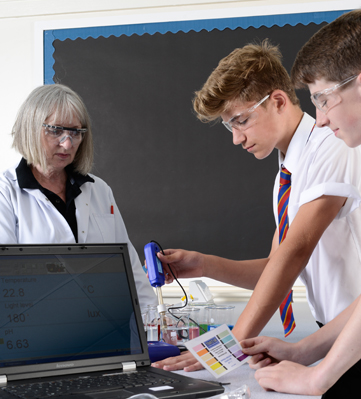
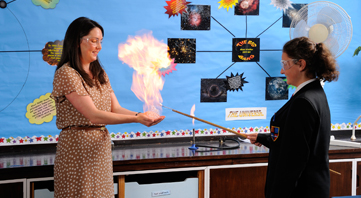
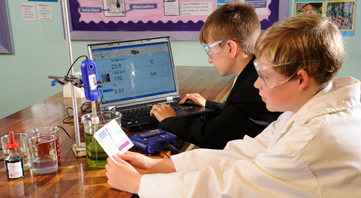
Year 7
Students will initially follow a Science transition unit which assesses their current knowledge and understanding as well as providing them with the skills necessary to become an effective scientist. Students will then learn about a range of topics, which includes cells and reproduction, adaptations, chemical reactions and forces and electricity. There is also the opportunity to attend the Science club, which takes place at after school.
Year 8
Students will build on their knowledge on understanding from Year 7 and learn about the structure of the Earth, elements, mixtures and compounds, energy, the environment, the human body and light and sound. The practical elements within each unit enable pupils to develop their investigative skills, such as planning an investigation to produce valid results, identifying risks and suggesting ways of working safely, data analysis and considering the reliability of secondary sources of evidence.
Year 9
Students will further enhance their understanding of biological, chemical and physical Science through a series of topics that are designed to prepare them for the rigor and challenge of the new GCSE Science courses. The topics covered include cell structure, enzymes, atomic structure, acids, motion, kinetic theory and circuit electricity. Opportunities are provided for students to further develop their confidence in using scientific equipment in preparation for the completion of the new compulsory GCSE core practicals.
Course Overview: Combined Science
Science at GCSE level aims to develop students’ knowledge and understanding of scientific theories, but also their ability to apply that knowledge, analyse and evaluate information, in practical and everyday scenarios. It gives students good life skills, regardless of the path they follow.
Practical work is still a very important part of the science GCSEs. Students will complete a series of Core Practicals not only to consolidate learning, but also to develop skills in planning, analysing and evaluating. These practical skills will be assessed as part of the written examinations at the end of the course.
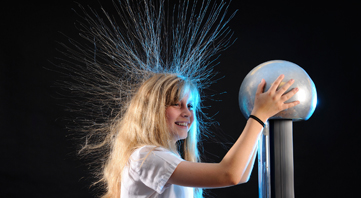
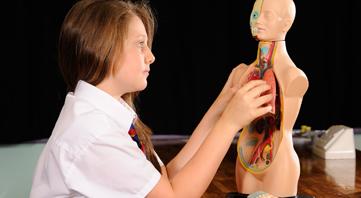
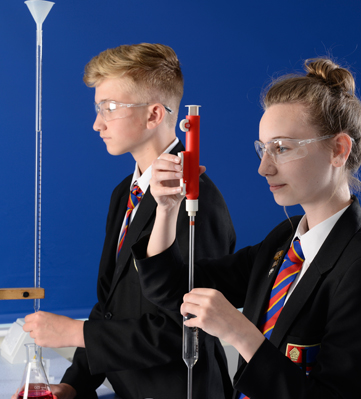
Course Components
Combined Science is a two-GCSE sized (double award) qualification covering the three science disciplines of Biology, Chemistry and Physics. Students are awarded a grade based on their overall performance across these three disciplines.
Biology topics include: Topic 1 – Key concepts in biology, Topic 2 – Cells and control, Topic 3 – Genetics, Topic 4 – Natural selection and genetic modification, Topic 5 – Health, disease and the of medicines, Topic 6 – Plant structures and their functions, Topic 7 – Animal coordination, control and homeostasis, Topic 8 – Exchange and transport in animals, Topic 9 – Ecosystems and material cycles.
Chemistry topics include: Topic 1 – Key concepts in chemistry, Topic 2 – States of matter and mixtures, Topic 3 – Chemical changes, Topic 4 – Extracting metals and equilibria, Topic 6 – Groups in the periodic table, Topic 7 – Rates of reaction and energy changes, Topic 8 – Fuels and Earth science.
Physics topics include: Topic 1 – Key concepts of physics, Topic 2 – Motion and forces, Topic 3 – Conservation of energy, Topic 4 – Waves, Topic 5 – Light and the electromagnetic spectrum, Topic 6 – Radioactivity, Topic 8 – Energy - Forces doing work, Topic 9 – Forces and their effects, Topic 10 – Electricity and circuits, Topic 12 – Magnetism and the motor effect, Topic 13 – Electromagnetic induction, Topic 14 – Particle model, Topic 15 – Forces and matter.
Combined science students will sit six exams at the end of the course. There will be two Biology exams, two Chemistry exams and two Physics exams. All exams are 1 hour 10 minutes, and each exam will cover half of the content for that discipline. There will be Foundation tier and Higher tier papers, and students must sit all six exams at the same tier. Foundation tier is for students who are aiming for grades 1–5, and Higher tier is for students who are aiming for grades 4–9.
As it’s a double award qualification, students will receive two grades. These grades could be the same number, e.g. 6, 6 or 7, 7. However, some students may receive a grade with adjacent numbers, e.g. 6, 7. This will signify a student who is at an intermediate point between the standard required for a 6, 6 grade, and the standard required for a 7, 7 grade.
Course Information
Key Stage 4 (2016-2018)
Course Name: Science
Qualification Type: Combined Science
Awarding Body: Edexcel
Specification code: 1SC0
Key Stage 4 (2017-2019)
Course Name: Combined Science
Qualification Type: GCSE
Awarding Body: Edexcel
Specification code: 1SC0
After school clubs are provided for keen students who wish to stretch their abilities. Catch up and support is also offered on a one to one basis where necessary. Some of the support sessions, clubs and activities offered are:
- Science club (lunchtimes)
- STEM challenges
- National Science week
- GCSE revision (Thursday after school)


